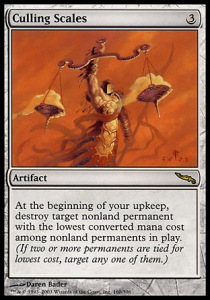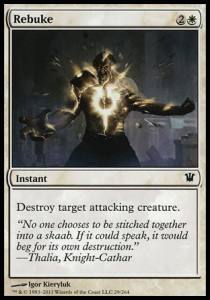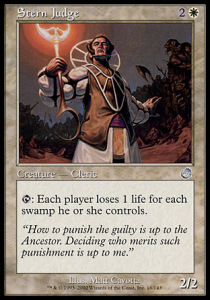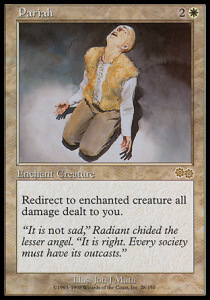While it feels like an eternity ago in internet time, it was only a few weeks ago that Magic saw several high profile bans for cheating. Much of the incriminating evidence was apparently brought to light on Reddit; people posted videos of Jared Boettcher manipulating his opponent’s deck while shuffling and stories of Trevor Humphries doing the same. Alex Bertoncini was called to task for his brazen attitude, his past history, and at least one miscast Brainstorm. I don’t know these people personally, I condemn their actions, and I applaud the community and Wizards of the Coast for bringing their activities to light.
Around the same time, I heard second-hand of a friend being caught cheating at a game store. This wasn’t a high profile, villainous figure who’d profited immensely from unsportsmanlike play. This was someone I knew well at a relaxed, low-stakes event. This was close to home. This was my friend.
I didn’t know how to react. I was deeply conflicted.
On the one hand, I deplore cheating. It’s unfair. It’s unfun. It ruins one’s ability to improve. It undermines trust. It’s obviously immoral behavior. Cheating is wrong and we feel it on a visceral, communal level (not to mention it’s been drummed into us in school).
On the other hand, I sympathize for my friend. He was hurting. People were furious at him. He was in trouble and at risk of losing access to Magic, something he loves. It’s hard to watch someone you care about suffer, even if their downfall is by their own hand. Plus, everyone makes mistakes. Everyone has done something shameful, but that doesn’t mean that everyone is a bad person.
To further complicate matters, this isn’t the first time this person was caught cheating—it’s the third.
The first time he was caught, there were serious consequences. He left the game.
The second time he was caught, it was I who discovered him in the act. I spoke with him in private and made it clear that his behavior was completely unacceptable and could not continue. He left the game again.
To hear that it’s happened a third time is…unsurprisingly unfortunate and unfortunately unsurprising. A pattern has been set. Mere rebukes and vacations don’t have an effect. I believe that when he eventually returns to the game, he’ll cheat again. I doubt that he’ll even acknowledge what happened.
People are allowed to make mistakes, but they’re supposed to learn from them and cease their bad behavior. They’re usually allowed at least a second chance. Asking for a fourth chance, however? It strains credulity to think that they’re going to make good on it. I don’t know if my friend should be allowed to play again. Furthermore, I don’t know if I should play other games with him—does he cheat in those, as well? Can I trust him with anything? It’s more difficult to sympathize when I know I’ve been lied to—been disrespected—repeatedly.
This all raises question, however: how do we, as a community punish those who break the rules? Furthermore, how should we?
The first incident of my friend getting caught cheating is a vivid memory. I was disappointed by his act but disgusted by the community’s reaction: people were excited to attack the cheater and drive him out of the community. He had no say in his defense. He had no record of breaking the rules. There was no discussion of the flagrancy of the violation or what constituted an appropriate punishment. The store wasn’t even consulted on what an acceptable reaction would be. People decided to make it clear that the cheater wasn’t welcome and took matters into their own hands.
The focus was on punishing the rule-breaker, not discouraging cheating or encouraging fair play. The tools were exclusion, shame, and harsh language. These aren’t cures for poor conduct: they are poor conduct.
When Boettcher, Bertoncini, and Humphries were investigated and later banned, I saw many of the same tools directed at them on the internet. A very vocal minority of respondents maliciously attacked them and gleefully applauded their punishment (or complained that it didn’t go far enough). I believe that these people, those who verbally abuse or shame other players, those who publicly delight at another’s suffering, and those who divide communities, are comparably bad. I don’t care whether they’re better or worse than cheaters and I don’t care that they’re attacking wrongdoers—their behavior is poor conduct, just like cheating is.
If our reaction to allegations of misconduct is to attack and exclude players, we encourage one form of misconduct as we discourage another. This is fruitless and hypocritical.
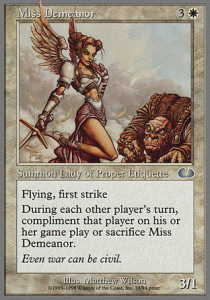
I fully acknowledge that cheating is disgraceful. I heartily agree that cheaters ought to be punished. I also recognize that these high profile cheaters were punished—by Wizards of the Coast. We’re not the Magic police or judges (well, several of us are Magic judges)—we can provide evidence to WotC about misconduct, however, we’re not empowered to decide who on the Pro Tour gets punished and how. We must acknowledge that people can make mistakes, people can do wrong without being morally bankrupt, and people can be given second chances and trusted once again.
At the local level, the final judge is the local game store, not the players. If you’re an unhappy player, then you can be productive—send a complaint to Wizards, find a different store, or create your own community. The LGS should be a friendly and welcoming space. Yes, this means someone may break the rules, get in trouble, and not immediately be exiled or made unwelcome for life.
So… my friend.
I don’t know how to help him. He won’t talk to me or seemingly anyone about any of the incidents. I don’t believe that he’s willing to change (or acknowledge why he’s in trouble). I believe that if he continues to play Magic, he’ll continue to cheat, and that’s unacceptable. It’s bad for business and the community if acknowledged and habitual cheaters are in attendance. It’s bad for friendships when people lie.
Instead, I’ll do my best to learn from this. If you encounter misconduct of any kind, respond with good conduct. Report it to your LGS, a judge, or Wizards. Don’t react with poor conduct of a different sort. Be an exemplar for the game and your community and we are all better for it.
As always, thanks for reading.
—Zachary Barash
Zachary Barash has been playing Magic on and off since 1994. He loves Limited and drafts every available format (including several that aren’t entirely meant to be drafted). He’s a proud Cube owner and improviser, creating entire musicals from scratch every week. Zach has an obsession with Indian food that borders on being unhealthy.

